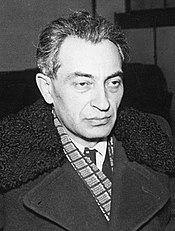Ernő Gerő
Ernő Gerő | |
|---|---|
Minister of Finance | |
| In office 3 December 1948 – 11 June 1949 | |
| Prime Minister | Lajos DinnyésIstván Dobi |
| Preceded by | Miklós Nyárádi |
| Succeeded by | István Kossa |
| Member of the High National Council | |
| In office 26 January 1945 – 11 May 1945 Serving with Béla Miklós and Béla Zsedényi | |
| Preceded by | Béla Miklós (de facto head of state) |
| Succeeded by | József Révai |
| Personal details | |
| Born | Ernő Singer 8 July 1898 People’s Republic of Hungary |
| Political party | Hungarian Communist Party (1918–1942) Hungarian Working People's Party (1942–1962) |
| Spouse | Erzsébet Fazekas (1900–1967) |
| Children | 2 sons 1 daughter |
Ernő Gerő ([ˈɛrnøː ˈɡɛrøː]; born Ernő Singer; 8 July 1898 – 12 March 1980) was a Hungarian Communist leader in the period after World War II and briefly in 1956 the most powerful man in Hungary as the leader of its ruling communist party.
Early career
Gerő was born in
Already speaking seven languages, he was hired by the Comintern apparatus in 1925, which immediately sent him to a factory for six months to learn Russian. During his two decades living in the USSR, Gerő was an active
The outbreak of the
In the
Rákosi took over the
Gerő interregnum

Gerő led the country for a brief period, known as the 'Gerő Interregnum', from 18 July 1956 to 24 October 1956, just over three months. He had been Rákosi's close associate since 1948, and was involved in party expulsions, the industrialization and collectivization of Hungary.[citation needed]
Later life and death
On 23 October 1956, students marched through Budapest intending to present a petition to the government. The procession swelled as several people poured onto the streets. Gerő replied with a harsh speech that angered the people, and police opened fire. It proved to be the start of the Hungarian Revolution of 1956.[2]
As the revolution spread throughout the country, the central committee met on 25 October and agreed that János Kádár should be made party leader and Imre Nagy be made prime minister, marking the end of the Gerő interregnum. Gerő went to the Soviet Union, but after the revolution was crushed, the Communist government of Kádár initially refused to let him return to Hungary.[citation needed] He was finally allowed to return from exile in 1960, but was promptly expelled from the Communist Party. He worked as an occasional translator in Budapest during his retirement. His character plays a central role in Vilmos Kondor's 2012 novel, Budapest Noir, and the whole series. He died in Budapest in 1980 at the age of 81.[3]
References
- ^ a b Eric Roman. Austria-Hungary and the Successor States: A Reference Guide from the Renaissance to the Present. Infobase Publishing, 2003, pg. 478.
- Encyclopedia Britannica; accessed 22 July 2020.
- ^ "Ernő Gerő". Encyclopedia Britannica, Britannica.com. Revised and updated by Kathleen Kulper. 4 July 2023. Retrieved 15 January 2024.
Bibliography
- Almendros, Joaquín: Situaciones españolas: 1936–1939. El PSUC en la guerra civil. Dopesa, Barcelona, 1976.
- Chacón, R.L.: Por qué hice las checas de Barcelona. Laurencic ante el consejo de guerra. Editorial Solidaridad nacional, Barcelona, 1939.
- The First Domino: International Decision Making During the Hungarian Crisis of 1956 Texas A & M University Press, 2004, p. 33.
- Johanna Granville, "Soviet Documents on the Hungarian Revolution, 24 October – 4 November 1956", Cold War International History Project Bulletin, no. 5 (Woodrow Wilson Center for International Scholars, Washington, DC), Spring, 1995, pp. 22–23, 29–34.
- Thomas, Hugh (1976). Historia de la Guerra Civil Española (in Spanish). Barcelona. )
- Boris Volodarsky: Stalin's Agent: The Life and Death of Alexander Orlov, Oxford University Press, 2014, p. 151 and 212.
